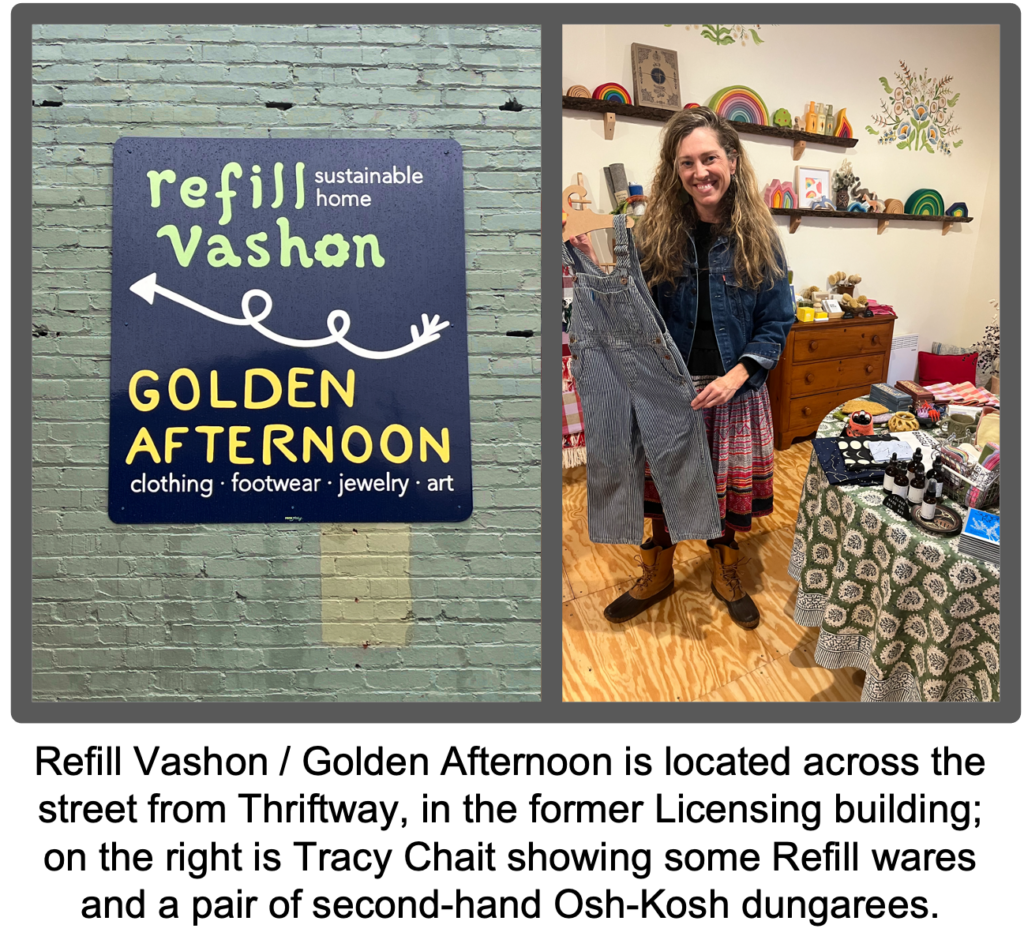By Caitlin Rothermel
An interview with Tracy Chait, owner of “Refill Vashon” and “Golden Afternoon”
Can you tell us about your background and what inspired you to start Refill?
It’s hard to pinpoint just one thing – it’s been a journey of many threads coming together. As a teenager, I was part of an Eco club and had a deep love for animals and the ocean. Growing up by the sea shaped my connection to nature.
Later, I became a teacher and did a lot of outdoor education, which reinforced my commitment to sustainability. I also worked in sustainable design and vintage clothing in California, focusing on eco-friendly interiors and vintage finds. Becoming a mom was another pivotal moment; I became more aware of reducing chemical exposure for my kids and started creating my own cleaning products in the kitchen.
Then, I got involved in a fiber shed project and sold products at the Farmers’ Market. Over the years, all these experiences wove together and culminated in this business.
How do you choose the products you sell?
At first, I focused on items I had used and trusted for years with my family. I also created many products myself, especially in the early days at the Farmers’ Market. As the business grew, I began collaborating with friends who are makers and artists, many of whom I wanted to represent in the store.
As we’ve expanded, I’ve done extensive research and product testing. My team and I trial everything before offering it to customers. I also like to find things when I travel.
Tell me about your clothing section, “Golden Afternoon”? How does that fit into your vision?
The clothing is entirely secondhand and exclusively for kids. I have a handful of friends who help source unique vintage and secondhand pieces, and I also find items myself. I love to offer secondhand clothing; it’s sustainable, and also more affordable and less “risky” for parents, especially as kids’ tastes and sizes can change quickly.
I also want it to feel welcoming here in the store, especially for families. We have a play area for kids, and it’s not unusual to see families visiting. It’s important to me that the space feels like a community hub.
What are some of your favorite products that you sell?
We have skincare and wellness items, including small-batch herbal tinctures, soaps, and refillable deodorants in glass jars. I prioritize plant-forward, clean ingredients.
We also sell ceramics and textiles – they’re not refillable, but the hope is that the design is really timeless and you won’t get tired of it in your home. Everything’s designed to be really durable and last a long time.
How can customers purchase your products, especially the refillable ones?
We encourage customers to bring their own containers for refills – it’s a big part of our sustainability effort. In the store, we have a refill section stocked with bulk items like dish soap, hand sanitizer, and laundry detergent. Customers can use their own bottles, or if they don’t have any, they can take one from our community crate, which operates on a take-one-leave-one basis. Our goal is to make refilling accessible and eco-friendly.
What would you say to someone who sees sustainable shopping as challenging or inconvenient?
I’ll admit it’s not as convenient as traditional shopping, but many meaningful things in life aren’t. Cooking from scratch, growing your own food – these things take effort, but offer great rewards. My advice is to start small. Pick one or two manageable changes and stick with them.
Start with easy swaps that integrate seamlessly into your routine. For example, our shampoo bars last 8-10 months, much longer than liquid shampoo, so you’re not constantly running out, and you’re reducing plastic waste.
“Unpaper” towels are another great starting point – they’re washable, save money, and reduce waste. Another idea is to stock up on essentials like dish soap or laundry detergent in bulk, so you’re not running out frequently.
The key is to focus on one or two changes at a time and build from there as they become habits. Once those habits are in place, you can add more sustainable practices at your own pace.
Any final thoughts you’d like to share?
I’m just really grateful to have a brick-and-mortar space where I can connect with people face-to-face. After so much time spent online, it feels refreshing to build a real community, seeing familiar faces, and creating a nice spot here.

